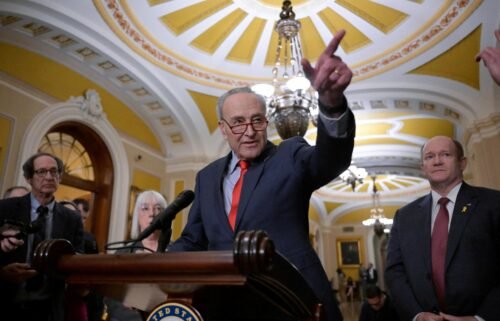Covid’s medical devastation will be felt by millions who never contract the disease

In our current moment of social distancing and necessary medical triage, millions of Americans are going without medical treatment, both preventive and elective. Those with pre-existing and undiagnosed chronic diseases throughout the country will not get care — and some will die — from lack of attention and treatment due to Covid-19. Many of them will never have even been infected by or shown symptoms of the virus — but their neglected illnesses must be accounted for when taking stock of its devastating toll on our society.
Over 800,000 Americans suffer a heart attack each year, according to the Centers for Disease Control and Prevention (CDC), which amounts to roughly one case every 40 seconds. Yet, as was noted recently by Dr. Harlan Krumholz in the New York Times, doctors in Europe and the US have been asking: “Where have all the heart attacks gone?” While Covid-19 cases have been surging throughout the world, physicians in Italy and Spain are reporting 40 to 70% reductions in major heart attack admissions, while cardiologists in Boston, Seattle, Minneapolis and Cincinnati have also been surprised by the 40% decline in presentation of the most severe heart attack patients at their hospitals.
It is too early to draw definitive conclusions about these numbers until more comprehensive data is available, there is a general unease around the cardiology community about this drop. On one hand, optimists have posited that people may be resting more, smoking less, facing less particulate matter with diminished pollution and avoiding stressful situations due to social distancing policies — leading to fewer actual heart attacks. Others, however, worry that what is actually happening is that some cardiac patients, afraid of being exposed to coronavirus, may be avoiding hospitals, minimizing their symptoms and staying at home.
Indeed, The Economist has reported that Bergamo province in Italy has tabulated 2,420 more deaths last month than in March of 2019 — but less than half of these additional deaths were listed as due to Covid-19 infection. One cannot help but wonder how many of these casualties were those who failed to seek care from non-coronavirus illnesses and died at home instead.
It stands to reason that some of the mortality totals we are attributing to Covid-19 may actually be an underestimation of the true magnitude of the crisis.
The avoidance of health care settings is not a problem unique to patients with heart disease. For the roughly half million Americans on biweekly dialysis for kidney failure (according to the National Institute of Diabetes and Digestive and Kidney Diseases), or the 650,000 the CDC estimates are receiving chemotherapy for cancer, shelter-in-place is not an option. They require these lifesaving therapies at special infusion centers or dialysis units for continued survival. Nevertheless, some of these patients may be choosing to postpone or avoid treatment altogether to avoid contracting Covid-19 at these facilities from other ill individuals.
Health system-level issues also contribute to the misery of people living with chronic disease. Those newly diagnosed with cancer may have to suffer the double anxiety of their new, deadly diagnosis while experiencing delays in the initiation of chemotherapy, radiation therapy and curative surgery. For those whose cancers have spread too widely and are no longer responsive to chemotherapy, experimental drug trials are their only hope for prolonging life. Because of Covid-19, these clinical trials, which were their only chance for a miracle, are being indefinitely postponed or canceled.
Furthermore, fear of contracting Covid-19 from health care settings has led to a major reduction in blood donations throughout the country. This has far reaching implications beyond patients with cancer or hematologic disorders who require regular blood transfusions to support their blood counts. This also means that there are far fewer lifesaving red blood cells, platelets and plasma products available for surgical patients and trauma victims, who may require emergency transfusions in the emergency department or operating room.
Even the search for provisional Covid-19 treatments is generating new risks for chronic disease sufferers. Hydroxychloroquine, prematurely touted by the president as a potential antiviral breakthrough, has a well-known side effect of increasing deadly irregular heart rhythms. Furthermore, the drug, which has yet to be proven to be efficacious in treating coronavirus, is an important medication for treating autoimmune disorders such as lupus. Patients with autoimmune diseases who have relied upon hydroxychloroquine for years to control their life-threatening conditions are now at risk of finding themselves without the medicine, as it is being redirected to the coronavirus effort.
Psychiatric patients, many of whom suffer from drug and alcohol addiction and homelessness, are a particularly vulnerable group in this pandemic as well. Social isolation can lead to dangerous self-medicating behaviors such as excessive alcohol, tobacco, and drug abuse. Domestic violence victims, trapped in their homes with their abusers, are reporting incidents at higher rates. Ominously, research has shown associations between economic recessions, as threatened by this epidemic, and substantial increases in suicides.
For health care providers hoping that these effects will last only for the duration of the pandemic, emerging reports suggest that the effects of the Covid-19 epidemic will continue to be felt for years following control of the virus. Heart attack patients, if not treated in a timely manner, can develop debilitating chronic heart failure. Psychiatrists and therapists are bracing themselves for the wave of mental health trauma sustained from first responders and front line health care providers, many of whom will have had to watch healthy young patients and their colleagues succumb to the disease. Among those spared from coronavirus infection, reduced physical activity from limited access to gyms and exercise equipment (combined with dietary shifting to unhealthy food choices to save money) may lead to obesity and other metabolic disturbances, potentially manifesting as future heart attacks, strokes, and diabetic complications.
When this pandemic abates, these cases of disability and death from chronic disease will likely not be counted among the casualties of Covid-19, since most of them will never have contracted the virus itself. Nevertheless, there is no doubt that the crisis contributed in some way to their suffering. To truly determine the magnitude of this disaster, it is thus critical that health researchers and physicians devote attention and funding now to studying these buried cases as the data arrives, incorporating their toll into the final epidemic body count.
In addition, the medical community needs to be prepared for a potential surge in non-Covid-19 chronic disease complications in the weeks and months to come when the immediate threat from coronavirus contagion subsides. Only by preparing ourselves for this flood of collateral victims will we avoid getting swept away by the pandemic’s second, silent wave of non-communicable diseases.

